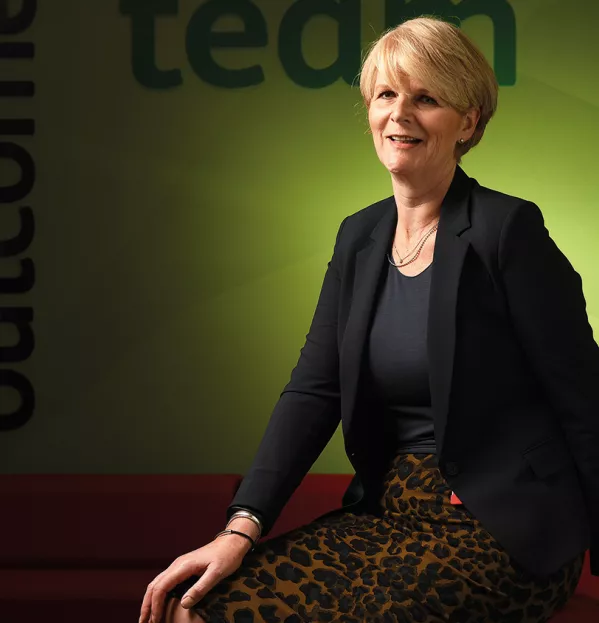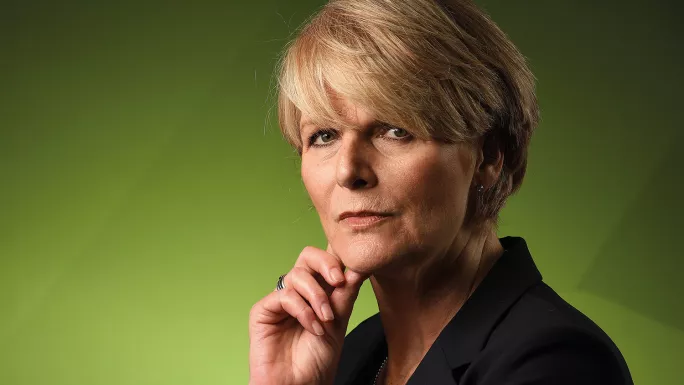‘My heart is with people who are disadvantaged in education and life’

During her seven years at the helm of Ucas, Mary Curnock Cook has become indelibly associated with the privileged world of academia. But in one of her final interviews as she leaves the admissions body, a question about her little-known voluntary role as trustee of the National Star Foundation, which runs the national specialist college for young people with learning difficulties and physical disabilities, reveals a far broader perspective on education.
“I think you’re the first person in an interview who’s asked about that,” she says. “[The National Star College is] just down the road from us in Cheltenham. Have you been? You should definitely go. It’s just the most amazing place...Because of the students, often with very severe physical disabilities and learning difficulties, it’s an extraordinary mixture of health and social care, as well as education.”
And one policy that particularly exercises Curnock Cook is the decision to give local authorities control over funding for SEND students aged 16-25.
“The thing that upsets me,” she continues, “is the stories I have heard of families having to fight to get the funding to send [young people] to a specialist college. Local authorities, on the whole, want students looked after in the locality. For these kids with the very severe disabilities, you can’t cater for them adequately other than in a specialist institution. And I think it’s just awful for them and their families; it’s such a fight to get the funding to go to a specialist college like National Star. It’s just heartbreaking - they’ve got enough to deal with without that.
“From my position of relative privilege, my heart is with people who are disadvantaged in education and life. This is a fact: very few National Star students will progress to higher education.”
‘Brilliant’ degree apprenticeships
Curnock Cook certainly has an appreciation of the value of the FE sector. College-based HE provision has a large role to play, she says: “I do think this a really important area for students who may not be ready to make the full leap to going to university but who can engage in HE through their local college.
“FE colleges pay a big part in that. I think we’ll see a resurgence in things like national diplomas and national certificates where people are taking more modular approach to getting a degree.”
Curnock Cook also hails the introduction of degree apprenticeships. Their growth has been marked, albeit from a small base: between August 2016 and January 2017, 940 starts at level 6 were recorded, up from 100 during the whole of 2014-15.
But while she describes the degree apprenticeships model as an “absolutely brilliant” one, especially as a means of upskilling existing employees, Curnock Cook does not think they are the best option for all young people.

“A lot of people go to university not really knowing [what job they want to pursue]; part of what university does for you is it helps you work out what your strengths are and what your preferences are. A lot of people I talk to early in their career [are] changing jobs every one or two years. It’s worth noting that signing up for a degree apprenticeships does mean staying in that same job with the same employer for what is, relatively speaking, a long period. That requires young people to be really sure about what they want to do.”
Curnock Cook is a strong advocate for the benefits of trying out different careers. Having left school aged 16 to work as a secretary, she went to university in her forties. “Because I’d decided to work in education, I probably thought it wasn’t credible to apply for senior positions in education without a degree,” she explains.
Before moving into education, she held marketing director roles at Food From Britain and International Biochemicals. In 1994, she became chief executive of BII, the professional body for licensed retailing, where she first gained experience of qualifications and awarding bodies.
From 1997 to 2001, she served as a council member on the former Further Education Funding Council (FEFC). In 2003, she joined the former Qualifications and Curriculum Development Agency as director of qualifications and skills before being handed the 14-19 brief, working on the doomed diploma qualification before it was scrapped by the coalition government in 2010.
She looks back on this as an “absolutely fascinating” time. “Completely dementing - I think we had five different secretary of state [in six years] - but it was absolutely fascinating,” she says.
Back in 2005, Sir Mike Tomlinson’s seminal report set out a blueprint for 14-19 education, arguing for the need to move away from the traditional break at the age of 16. But Tony Blair, the prime minister at the time, “had a wobble about the wisdom of doing away, in effect, with A levels,” Curnock Cook recalls.
“It’s an iconic brand that has been around for 50 years or so and has huge currency, not just in this country but internationally as well. The long and short version of it was a watered down version of Tomlinson, which was the diploma. And the rest is history…They hadn’t really had time to take hold. The diplomas weren’t quite right. Could they have been got right? Yes, I think they probably could have.”
In any case, Curnock Cook hopes that some of the “high quality work” behind the qualifications could inform the introduction of T levels, the latest alternative qualification put forward by ministers.
She supports the proposals - but offers a word of warning to the next set of ministers at the Department for Education. “One of the problems with qualifications is the temptation to move too quickly. In days gone by, any big change in GCSEs and A levels would have been piloted for at least two cohorts before [being] released into live awarding. That takes three years to do a two-cohort pilot, and governments are often in a hurry.
“But I think if you want a qualification reform to be right and stick, personally, I think that piloting is an absolute essential. So I really hope the Post-16 Skills Plan builds in time to do that.”
‘Not too fussed’ about GCSE change
As for the other big qualifications change coming in, the switch to the 9-1 grading system for GCSEs, Curnock Cook insists she is “not too fussed” about the confusion that could arise as a result.
Having been through numerous changes to qualifications over the past two decades, Curnock Cook understandably takes a long view.
“If you talk to people of my vintage, they still talk about O levels. On the one hand, it takes a long time for public consciousness to catch up. But you’ll have 650,000 students a year doing the new GCSEs with new grades, multiply that by them plus their two parents…Even though it’s a worry in the first year, people will very quickly get familiar with it. It will quickly get absorbed into national consciousness.”
So what after Ucas? Curnock Cook insists she has no plans to take on a full-time role, but intends to do two days’ paid work a week. As to what this work will be, and whether she will remain in the education sector, she remains cryptic: “Nearly there, but not enough to be able to tell you about it.”
Alongside this she plans to dedicate two days a week to her voluntary roles, and one day to “pursue my own interests”. “Probably mostly around education,” she adds. “Who knows? I might even go to university.”
You need a Tes subscription to read this article
Subscribe now to read this article and get other subscriber-only content:
- Unlimited access to all Tes magazine content
- Exclusive subscriber-only stories
- Award-winning email newsletters
Already a subscriber? Log in
You need a subscription to read this article
Subscribe now to read this article and get other subscriber-only content, including:
- Unlimited access to all Tes magazine content
- Exclusive subscriber-only stories
- Award-winning email newsletters